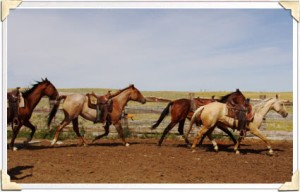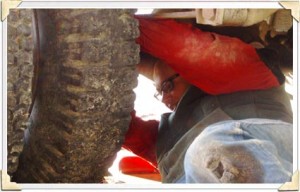Billings, Montana
Jeanne Charter passed away in 2011. Our sympathies go out to Jeanne’s family and everyone who was touched by her work.
Jeanne Charter has been cattle ranching with her husband for the past 25 years near Billings, Montana. The Charters have been heavily involved in activism at the federal and local level to promote sustainability in farming practices. Jeanne is a representative to the Montana and northern plains regional board of WORC – the Western Organization of Resource Councils. WORC, a Farm Aid funded group, is a network of six state grassroots organizations working for change on the environment and family agriculture.
In many ways, the cattle farm that Jeanne and Steve Charter run just north of Billings, Montana, is very traditional. The ranch has been in Steve’s family for three or four generations. The Charters use dogs to encourage their cattle’s mothering instincts, and spend hours in the pasture mending fences. In one very innovative way, however, the Charters stand out in the field. Anticipating farming needs and constraints of the future, the Charters are working tirelessly to promote more sustainable energy production and utilization and to be a leading example in their community as they fight for change from the ground up.
When the Charters got married in 1975, they spent five years working on farms for other people before they moved back to the family farm. When they did, they built a solar-powered house. In the winter, the Charters rely on solar energy for 90% of their heat, and use wood for the rest. We asked Jeanne why they chose to build a solar house for their ranch:
“It’s really sunny, so a solar house works well here,” Jeanne said. “It was one of the first discussions we had of going to renewables, and we thought we should put our money where our mouth was.”
Jeanne has long been involved in farm advocacy and politics, and Steve has spent time organizing within the community. They both believe strongly in long-term energy policy change, and Jeanne says that for it to work it needs to happen on a grassroots level.
“We’ve worked long and hard at the federal level to try to get our reform,” Jeanne said. At this point, Jeanne told us, farmers really need to start making changes themselves in how they operate. She envisions communities working together to create sustainable practices. The Charters’ farm depends greatly on work with their neighboring farms, and Jeanne sees enormous potential for neighbors working together to spread change in farming practices.
Probably the Charters’ most widely publicized new idea is their use of the residue from pressing seeds for biodiesel as winter meal for their cattle.
“It’s a good livestock feed, especially because there’s some residual oil left in it,” Jeanne said. The oil provides fat, which is important for mostly grass-fed cattle in the winter, and the seed itself is also high-protein, making it a really ideal feed.
 The Charters also use a complex system of time control grazing: rotating cows through pastures to avoid overgrazing anywhere. As Jeanne explained, the vast bulk of a plant’s mass is in the roots and the roots absorb more carbon than any other part of the plant. When plants are cut or grazed too often, they put their energy into growing new shoots instead of root development, resulting in less carbon absorption. Controlled pasture rotation works to promote root growth and maximize the amount of carbon being sequestered.
The Charters also use a complex system of time control grazing: rotating cows through pastures to avoid overgrazing anywhere. As Jeanne explained, the vast bulk of a plant’s mass is in the roots and the roots absorb more carbon than any other part of the plant. When plants are cut or grazed too often, they put their energy into growing new shoots instead of root development, resulting in less carbon absorption. Controlled pasture rotation works to promote root growth and maximize the amount of carbon being sequestered.
“It’s a dynamic that’s really there,” Jeanne said about the relationship between time control grazing and soil and root development. “We’ve been doing this for about 25 years and through some really dry periods; there’s no doubt at all that we’ve improved our land, and that’s because of the rooting underground.”
As the Charters look toward the next election, however, its not sustainable biodiesel or energy that worries them most, but the economy. In fact, the first thing Jeanne does each morning is turn the radio on to listen to market news. As Jeanne explained, many cattle farmers rely on a credit system to buy and sell. The Charters sell most of their cattle though auctions, live and online.
“People depend a lot on credit, hardly anybody just runs off money,” Jeanne said. “Most people make a wage, but not immediately.”
Sustainable farming practices are necessary and important, but Jeanne believes such developments can happen in a more grassroots way, over time. A reliable credit system, on the other hand, is essential to the system of buying and selling cattle that the Charters and their neighbors depend on. And she believes this is something that needs a solid policy solution from the top.
“We’re very dependent on a functioning credit system,” Jeanne said, saying that everybody she knows has loans in the bank.
Even with all of their renewable energy concerns and innovations, at the heart of things, the Charters are just trying to run a profitable farm. This winter, they’ll be feeding the calves more of the biodiesel residue meal, staying warm in their solar powered house, and doing their part to save energy and sequester carbon, one pasture at a time.



